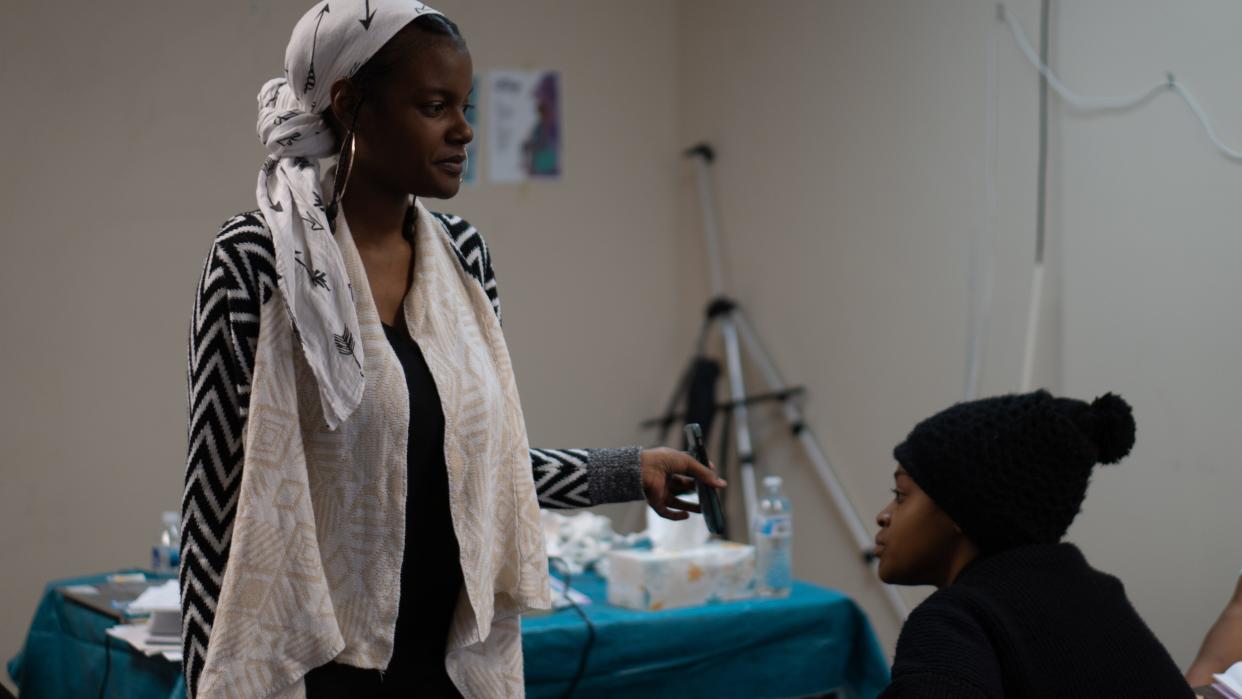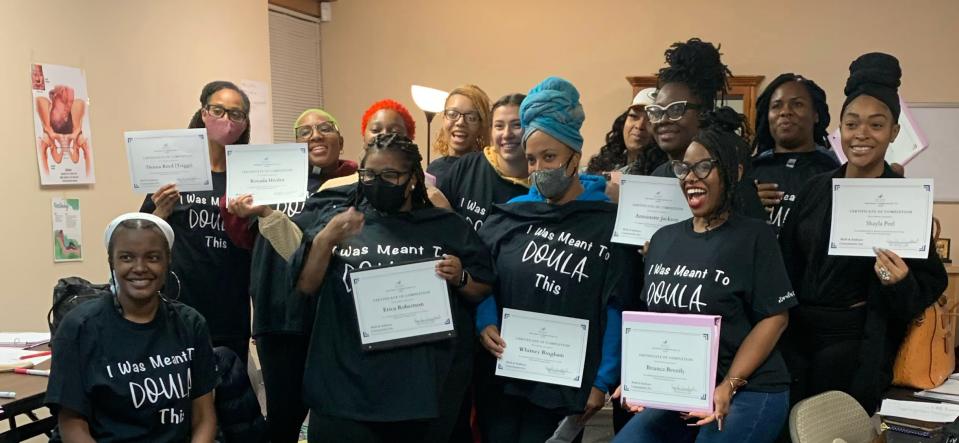Milwaukeean is one of the first Black women to train birth doulas

Over the past few years, Milwaukee-area doulas have noticed an increased interest in their profession.
Doulas are non-medical professionals who are trained to assist pregnant people through childbirth. While doulas have been utilized by pregnant people for centuries, especially in communities of color, the recognition of a need for assistance and advocacy has increased partly due to greater attention to the higher rates of maternal and infant mortality in the African American community.
A few years ago, Milwaukee's African American Breastfeeding Network received grants to start the Community Doula Initiative, a project that educated and supported African American doulas in the Milwaukee area and trained them to lead information sessions in their communities.
More recently, Milwaukee doula Kay'La Mumford, with assistance from AABN and doula colleagues, received a grant from the Wisconsin Partnership Program for the WeRISE program, to train 25 African American community doulas to provide labor and delivery support to 100 Black women in Milwaukee, Racine and Kenosha counties.
The importance of cultural education in doula training
While Mumford and her doula colleagues have noticed the increased interest in doula-assisted childbirth and are especially thrilled with the increase in Black doulas and in Black people who give birth with the assistance of a doula, they've also noted that something important is missing. Most doula trainers continue to be white and lack the cultural component in their training that's necessary for up-and-coming doulas — especially community-based doulas — to understand.
A doula training certification typically includes workshops, reading, in-person classes on topics like childbirth education and breastfeeding and attendance at a certain number of births under the supervision of health professionals and a doula mentor.
Many groups that offer doula training certification have recently updated their curriculum to reflect the importance of cultural competence. For example, DONA International — the largest and oldest doula certification organization in the world — offers webinars that highlight cultural education and the impact of race and gender privilege on birth. Books related to cultural competence — such as "Delivered by Midwives: African American Midwifery in the Twentieth Century South" — have also been added to the reading requirements for DONA's doula certification.
However, many doulas believe there needs to be a more comprehensive focus on issues specific to Black pregnant people and Black doulas — and those classes should ideally be taught by Black doulas.
That's where Mumford comes in.
The importance of Black representation in doula training
"In 2019, I was pregnant with my second daughter, and I didn't want to go back to the hospital and be judged for being a single mom. I had a home birth with a midwife, and it was really great," said Mumford. "I didn't want to be a midwife, but I wanted to help people. There was a doula training two weeks after I had my daughter. I went there with a newborn and all and from there I got certified. I've been going hard at it ever since."
Mumford said she learned valuable information from her doula training, but she didn't receive training in how to help people from marginalized communities advocate for themselves.
Following her work on the WeRISE project, she formed her own nonprofit, Birth & Embrace Community Inc. "to provide equality to birthing BIPOC and Black birth workers." She began offering doula training courses at the end of 2020, and, although the most recent COVID-19 surge has forced her classes to go virtual, they are continuing in the new year.
"Right from when we started the WeRISE project, I knew I wanted to expand resources for marginalized communities," said Mumford. "The main goal of my nonprofit is to provide equity for both birthing people and birth workers who are members of marginalized communities."
Milwaukee doula Terri Simmons has seen firsthand how Mumford's experience — both with her own births and with her advocacy for others — informs Mumford's trainings.
"Kay'La has some lived experiences of how birth affects the BIPOC community, and she also has always seen birth work through the lens of birth equity," said Simmons. "She puts numbers on some of the disparities and shows the history behind some of the doula practices. I love that overarching cultural relevance piece she includes that I've found other trainers to be lacking."

Another Milwaukee doula, Mia Morse, said Mumford's is the first doula training class taught by a Black person that she knows of in Milwaukee. Morse said her own doula training was valuable and informative, but that it lacked some factors that are "specific to Black and brown culture." For example, Morse said doulas who have Black clients should understand that family members beyond the immediate family — such as grandparents, aunts and uncles — often participate in the birthing process more than in white families, and therefore need to be included in the education and advocacy process.
Morse also noted that Mumford's focus on birth equity gives marginalized communities the opportunity to access education that is often unavailable to them.
"Nine times out of ten, most families don't know anything about the birthing process because we don't have the education and resources available, especially in the inner city, that are affordable and attainable," said Morse. "Most birthing classes are in hospitals and could cost a lot of money."
Morse also said racial stereotypes and systemic racism make it more difficult for Black women to be heard — a problem that must be overcome both by Black people when they are giving birth as well as the Black doulas who advocate for them.
"Black women are often looked at as not being as educated, and looked at as being stronger, that they can take more pain than white women, and that's not true," said Morse. "And it's been proven all over the world that a woman can be saying there's something wrong with my baby, and they're overlooked. Doulas give women a voice, and encourage them to ask questions if something doesn't feel right, and to not be scared to share that with your provider."
The importance of understanding the history of doula work
Simmons thinks Mumford's training goes a long way toward helping Black women feel empowered to express themselves not just by training them to advocate for themselves, but also by giving them ownership of the concepts of doula work itself. She pointed out that the "granny midwife" in Black communities was the origin of doula work.
"That's not a main focus in a lot of training, but Kay'La talks about the history of doula work and Black women's contributions, even in slave times when there were nannies and women tasked with breastfeeding slave masters' children," said Simmons. "Understanding those types of dynamics has an influence on where we are in the modern childbirth community."
Lakeeta Watts appreciates that Mumford's focus on the traditional contributions of BIPOC communities to doula work isn't just "a brief overview"; rather, it's infused into the tenor of the entire training.
"She goes back to the roots of what history shows us when it comes to birthing in Black families. She also talks about Hmong culture, and other people of colors' traditions," said Watts. "It's having this discussion of how this culture does birth, and how this other culture does birth, and she focuses on getting in tune with the traditions of people of color in birthing environments."
Watts said Mumford's training feels more intimate than others — although modern medical needs are also emphasized, there's more of a feeling of camaraderie and sisterhood among doulas than in other training programs.
Mumford said her doula certification program requires 30 hours of classes and workshops, attendance at three births and work with a "doula sister" mentor. She also encourages her students to participate in a doula healing circle, noting that novice doulas often don't realize that birth work can be traumatic. The healing circle allows new and experienced doulas to share their experiences, support each other and discuss what they could have done differently in certain situations.
"There are a lot of birth workers who have been doing this work for awhile, and we haven't seen the systemic changes we want yet. And that's because it's going to take even more people to do this," said Mumford. "I know I'm not going to do this work forever, so I want to help bring more people on so we can do the work together."
Contact Amy Schwabe at (262) 875-9488 or amy.schwabe@jrn.com. Follow her on Twitter at @WisFamilyJS, Instagram at @wisfamilyjs or Facebook at WisconsinFamily.
Our subscribers make this reporting possible. Please consider supporting local journalism by subscribing to the Journal Sentinel at jsonline.com/deal.
DOWNLOAD THE APP: Get the latest news, sports and more
This article originally appeared on Milwaukee Journal Sentinel: A Black doula in Milwaukee trains other Black people to be doulas

